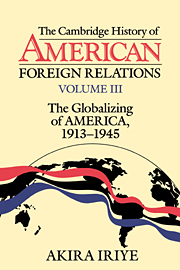Book contents
- Frontmatter
- 1 The age of European domination
- 2 The Great War and American neutrality
- 3 The United States at war
- 4 The Versailles peace
- 5 The 1920s: the security aspect
- 6 The 1920s: the economic aspect
- 7 The 1920s: the cultural aspect
- 8 The collapse of international order
- 9 Totalitarianism and the survival of democracy
- 10 The emergence of geopolitics
- 11 The road to Pearl Harbor
- 12 The global conflict
- Bibliographic Essay
- Index
- THE CAMBRIDGE HISTORY OF AMERICAN FOREIGN RELATIONS
- References
5 - The 1920s: the security aspect
Published online by Cambridge University Press: 28 March 2008
- Frontmatter
- 1 The age of European domination
- 2 The Great War and American neutrality
- 3 The United States at war
- 4 The Versailles peace
- 5 The 1920s: the security aspect
- 6 The 1920s: the economic aspect
- 7 The 1920s: the cultural aspect
- 8 The collapse of international order
- 9 Totalitarianism and the survival of democracy
- 10 The emergence of geopolitics
- 11 The road to Pearl Harbor
- 12 The global conflict
- Bibliographic Essay
- Index
- THE CAMBRIDGE HISTORY OF AMERICAN FOREIGN RELATIONS
- References
Summary
Disarmament
The postwar world began in 1919, with the signing of the Versailles peace treaty. Nobody could tell then how stable the new structure of peace would be, or even what the structure meant in different regions of the world. With the U.S. Senate refusing to ratify the treaty, some were already writing off the just begun postwar period as but a brief interlude in otherwise conflict-ridden international affairs, and many were pessimistic about the future of the League of Nations as well as other arrangements the powers had worked out in Paris.
The world during 1919–20 did, indeed, seem very precarious, little different from the situation on the eve of the Great War. Not only did the United States not participate in the League, thus apparently reverting to prewar isolationism, but the peace treaty was proving extremely unpopular in many countries: Germany, Italy, China, and others. In these countries movements were already developing to denounce the peace treaty and what it signified. The Germans condemned the punitive aspects of the peace, the Italians thought they should have gotten more out of it, and the Chinese were disatisfied because the treaty had not forced the Japanese to withdraw from Shantung.
The situation was still unstable in the Soviet Union, and Poland seized the opportunity to invade the revolutionary nation. In Hungary, in the meantime, a radical government established itself, giving rise to fears elsewhere that Bolshevism was spreading. The creation, in 1919, of the Communist International, to coordinate Communist activities throughout the world, conjured up the spectacle of a global movement to challenge the peace.
- Type
- Chapter
- Information
- The Cambridge History of American Foreign Relations , pp. 73 - 87Publisher: Cambridge University PressPrint publication year: 1993



